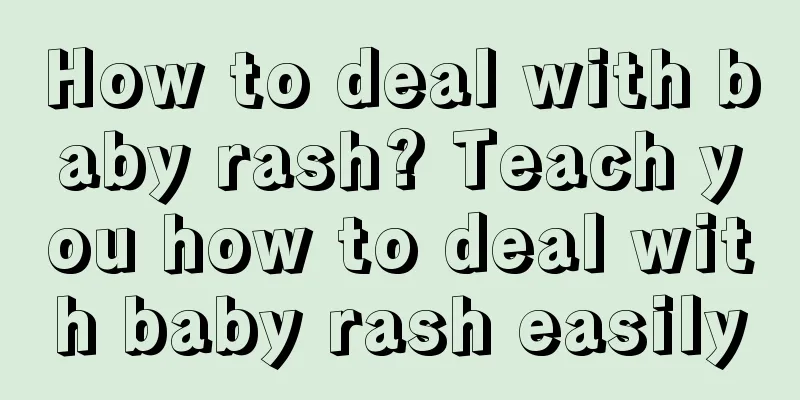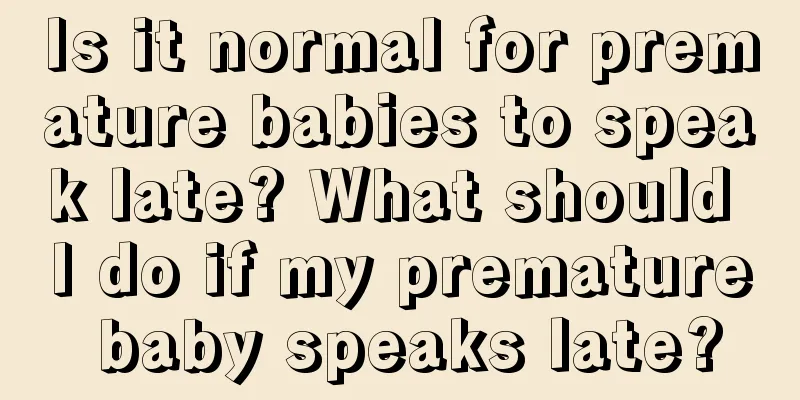At what age does a child enter the rebellious period? How should a child be guided during the rebellious period?

|
The rebellious period has become an indispensable part of our growth process. So, at what age does a child enter the rebellious period? At what age does a child begin to rebel?Young children will show a strong sense of disobedience at a certain stage, which is a person’s first rebellious period. The second rebellious period occurs at the age of 7-8. The third rebellious period occurs between 13 and 18 years old, which is what people call adolescence. What is the rebellious periodThe "rebellious period" is a term used by psychologists to refer to the period when children's self-awareness develops rapidly and they have an urgent need for independence, autonomy, and freedom. Typical manifestations of children's rebellious period1. Highly destructive: throwing things, taking apart toys, scribbling, tearing up books, and deliberately throwing toys all over the floor. 2. Stubborn and have strong emotional reactions: Insist on having a specific thing, even if it looks the same; Insist on wearing certain clothes or shoes, even if they are not suitable for the season; Be determined to do what you want to do, otherwise you will cry and make a fuss; Sit on the ground and act like a spoiled child or even hit others in public. 3. Go against parents and ignore them: refuse to do anything parents ask, and want to do things more often than they are forbidden to do; ignore parents, and would rather play by yourself than play with them. 4. Challenge rules and authority and push for bottom lines: intentionally break previously established rules; make new demands one after another; negotiate conditions with parents and only do things if the demands are met. 5. Conflicts with other children and prone to violence: When playing with other children, they fight for the same toy, fight for the order of play, are unwilling to share toys with others, but love to snatch other people's toys, and even hit others in serious cases. How do parents get along with rebellious children?1. Parents should see their children's growth, respect their self-esteem, establish a close and equal friendship with them, and allow their children to participate in the management of the family. 2. Parents should believe that their children have the ability to handle things independently and support them as much as possible. They should encourage and comfort them when they encounter difficulties or failures, and praise them as much as possible when they succeed. 3. Parents should have the courage to ask their children for advice and the courage to admit their mistakes. Children understand their parents. Parents need to be respected by their children. Most of them regard their children's happiness as their own life. Their advice is often a summary of their own life experience and has a certain reference value. Children should often talk to their parents about their thoughts and activities. When their choices are contrary to their parents' wishes, they should resolve it through discussion and present facts to prove that their choices are correct. |
>>: Does the child snore because he is sleeping soundly? What is the reason for the child snoring?
Recommend
What to do if you have pain and bleeding during intercourse after a cesarean section? How to avoid pain and bleeding during intercourse
If you experience pain and bleeding during sex af...
What is induction labor? What is suction labor?
Childbirth refers to the process of giving birth ...
How to deal with various discomforts in the third trimester? Which rumors about pregnancy are wrong?
During pregnancy, many pregnant women will experi...
How long does it take for premature infant jaundice to subside? What is the normal value?
Jaundice is a common disease in babies, and prema...
How to correct a baby's pigeon-toed feet? At what age can a baby's pigeon-toed feet be corrected?
How to correct the baby's pigeon-toed feet is...
How to make your child grow taller by using massage techniques
Massage is one of the most basic health-preservin...
What should I do if my child is picky about food and doesn't grow? What should I do if my child is particularly picky about food?
It is quite common for children to be picky eater...
Why do children have swollen eyes due to allergies? How to reduce swelling in children's eyes due to allergies?
Everyone is likely to experience allergic symptom...
What should you prepare in your maternity bag? The most complete list of maternity bags recommended by mothers
Giving birth is a painful and happy process, but ...
Which one is better, Gusao Pills or Tianxi Pills? Which one is better, Tianxi Pills or Gusao Pills?
Tianxi Pills and Gusao Pills both have the effect...
Is it normal for a newborn baby to fart and have diarrhea after breastfeeding? Is it normal for a newborn baby to have yellow diarrhea after breastfeeding?
For breastfed babies, mothers often observe their...
How old is the baby suitable for wearing underwear? What are the benefits of wearing underwear for babies?
In real life, many people think that babies are s...
Can Safeguard soap be used for bathing? What are the effects and functions of Safeguard soap?
I don't have any shower gel at home and I for...
How often should baby's nails be trimmed? At what age can baby's nails be trimmed?
When mothers are taking care of their babies, the...
Can I keep the baby without taking medicine if my progesterone level is low? Can I take Chinese medicine to treat low progesterone?
Low progesterone needs to be treated in time, oth...









